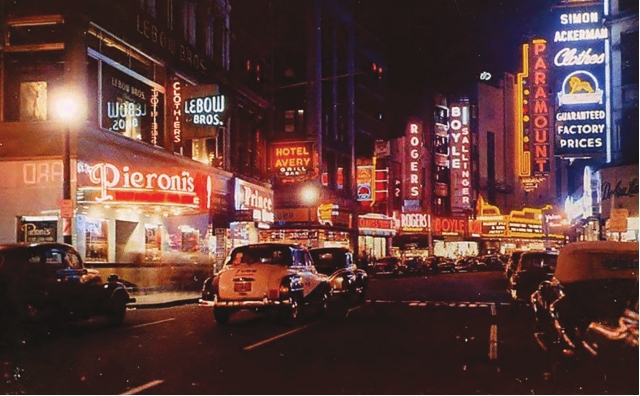
Washington Street in the 1960s Opposition to electronic billboards was on full display at a City Council hearing last week. Community members and elected officials opposed measures that would enable new billboards, and many advocated a total moratorium or abolition.
A 2020 proposal to amend the zoning code would have permitted electronic billboards through a simple variance
from the Zoning Board of Appeals. A second proposal would have expanded
allowed hours of operations from the current 7 am to 2 pm to be 6 am to
midnight.
Both
proposals passed the Boston Planning and Development Agency in March,
2020, but have not yet proceeded to the Zoning Commission due to
community pushback.
Electronic
billboards are currently forbidden in most parts of the city; but the
new and converted billboards have successfully passed, especially along
highways.
Three
special districts in downtown permit electronic signs with fewer
constraints around Lansdowne Street, the Theater District, and the South
Boston Waterfront, according to Mark McGonagle, community affairs
liaison for the Boston Planning and Development Agency.
A
longform permit application is required for both new and alterations to
existing, billboards, said Chris English, Chief of Staff at
Inspectional Services.
According
to Ford Cavallari, chairman of the Alliance of Downtown Civic
Organizations, who testified last week, the number of applications has
increased during Covid restrictions.
He
said this increase was part of a deliberate strategy to skirt
opposition during remote meetings and that enforcement of the ostensible
ban on new and converted billboards has weakened in recent years.
Cavallari advocated strictly limiting all new electronic billboards to
their designated districts and requiring that any other proposals first
designate a new district. The Zoning Board of Appeals should be told not
to grant any more variances for electronic billboards.
That view was widely supported by members of neighborhood associations who testified at the City Council.
Beacon
Hill Civic Association board member Rachel Thurlow noted that the state
constitution permitted municipalities to regulate and ban billboards
for more than one hundred years and that the zoning code was not
intended to monetize public space.
“Electronic billboards do not belong in a densely populated neighborhood like Chinatown,” said Linda See of the
Chinatown Residents Association. She said poor communities of color
often bear the brunt of electronic light pollution.
See
added, “These well-funded billboard operators wage a war of attrition
against the Chinatown community,” by delaying hearings repeatedly until a
favorable or nonexistent audience can be found.
“We
are in a world where we spend all of our time looking at screens,” said
Kenzie Bok, City Councilor for Fenway, Kenmore, Back Bay and Beacon
Hill.
Electronic billboards are distracting for drivers and corrosive to the city’s historic fabric, Bok said.
“They are, from every perspective in the areas where they’re
being proposed, absolute abominations,” added Martyn Roetter, member of
the board of directors of the Neighborhood Association of the Back Bay.
Roetter
compared the harm from light pollution to air or water contamination
and said the traditional zoning process was inadequate to manage those
harms.
“Light doesn’t stop at three hundred feet,” said John Bookston, board member of the Fenway Civic Association. “Just ban it.”
“As
a resident of the city, I have a reasonable expectation that there will
not be a billboard put in front of my home,” said Ryan Powers, a
longtime downtown resident.